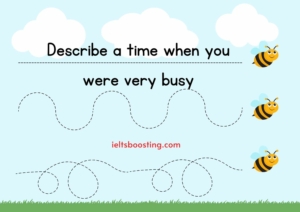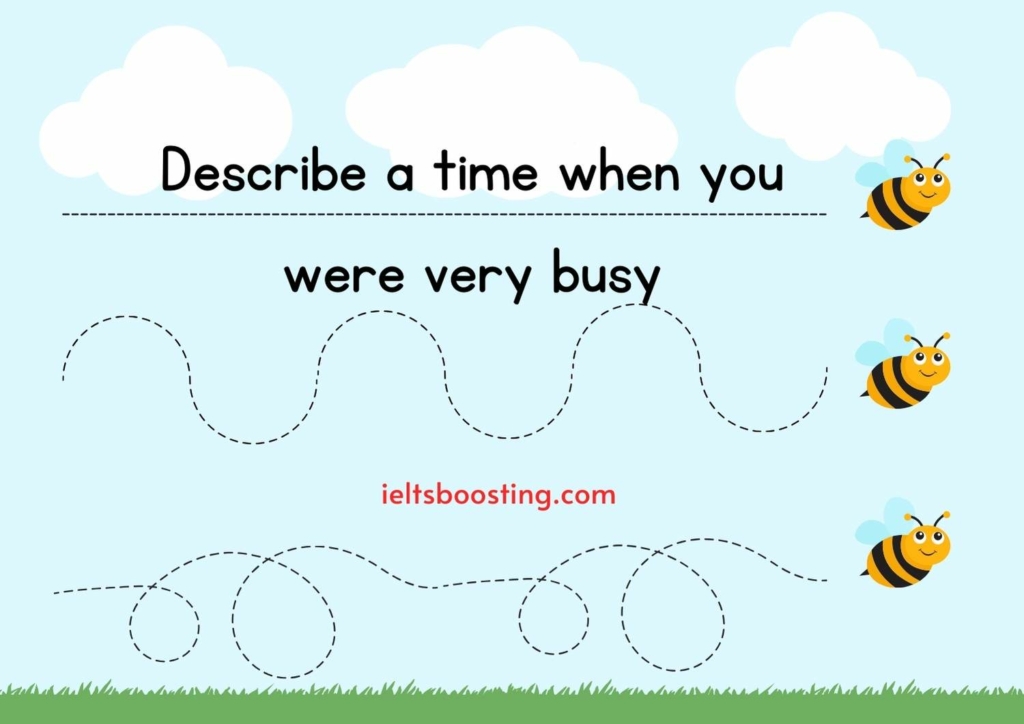Describe a time when you were very busy
You should say:
When this time was
Why you were so busy
What you did to deal with the situation
And explain how you felt about being so busy
Sample answer
Simple version
I recall a period when I was exceptionally busy. It was around two years ago, during the final semester of my university studies. The primary reason for my busyness was the convergence of multiple deadlines: I had to prepare for crucial exams, complete a demanding group project, and write my dissertation.
To manage this intense period, I created a strict schedule. I allocated specific hours for studying, group meetings, and writing. I also cut down on social activities to focus on my academic responsibilities. Prioritizing tasks and staying organized were key. I remember often working late into the night, ensuring each task received adequate attention.
Despite the stress, I found a sense of accomplishment in managing my time effectively. It was exhausting, but there was also an adrenaline rush in meeting each deadline and ticking off tasks from my to-do list. This experience taught me a great deal about self-discipline and time management.
In retrospect, although I was overwhelmed at times, I felt proud of my ability to handle such a workload. It was a challenging period, but it also boosted my confidence in my capabilities and resilience under pressure.

Describe a time when you were very busy
Formal version
I recall a period when I was exceptionally busy. It was around two years ago, during the final semester of my university studies. The primary reason for my busyness was the convergence of multiple deadlines: I had to prepare for crucial exams, complete a demanding group project, and write my dissertation.
To manage this intense period, I created a strict schedule. I allocated specific hours for studying, group meetings, and writing. I also cut down on social activities to focus on my academic responsibilities. Prioritizing tasks and staying organized were key. I remember often working late into the night, ensuring each task received adequate attention.
Despite the stress, I found a sense of accomplishment in managing my time effectively. It was exhausting, but there was also an adrenaline rush in meeting each deadline and ticking off tasks from my to-do list. This experience taught me a great deal about self-discipline and time management. In retrospect, although I was overwhelmed at times, I felt proud of my ability to handle such a workload. It was a challenging period, but it also boosted my confidence in my capabilities and resilience under pressure.
Vocabulary and collocations
- Exceptionally busy: Extremely or unusually occupied with activities.
- Final semester: The last term or portion of an academic year.
- Convergence of multiple deadlines: The occurrence of several due dates approaching at the same time.
- Crucial exams: Extremely important or decisive tests.
- Demanding group project: A challenging collaborative task requiring significant effort.
- Strict schedule: A precise and rigorously followed plan of activities.
- Allocated specific hours: Designated or assigned particular times.
- Cut down on social activities: Reduced the frequency of leisure interactions.
- Prioritizing tasks: Arranging or dealing with tasks in order of importance.
- Staying organized: Maintaining an orderly and efficient arrangement.
- Working late into the night: Engaging in tasks well beyond usual working hours.
- Sense of accomplishment: A feeling of fulfillment or achievement.
- Managing time effectively: Utilizing time in a productive and efficient manner.
- Adrenaline rush: A burst of energy typically caused by excitement or stress.
- Self-discipline: The ability to control one’s feelings and overcome weaknesses.
- Time management: The process of planning and exercising control over the amount of time spent on activities.
- Overwhelmed: Overpowered with emotions or workload.
- Resilience under pressure: The capacity to recover quickly from difficulties while facing stress.
Forecast speaking from 1-4 2024
Part 3-Describe a time when you were very busy
Why do people often feel tired in this day and age?
People often feel tired in this day and age due to the fast-paced lifestyle that is common in modern society. Many are juggling work, family commitments, and social obligations, leading to a constant state of busyness. The prevalence of technology, especially smartphones and computers, contributes to this fatigue, as it encourages longer working hours and less restful sleep. Additionally, the pressure to succeed and be constantly productive can create stress, which is a significant factor in feeling tired.”
Useful Vocabulary:
- Fast-paced lifestyle: A way of living that is very active and busy.
- Juggling: Trying to manage or balance multiple activities or responsibilities simultaneously.
- Family commitments: Obligations related to one’s family.
- Social obligations: Duties or responsibilities to participate in social events or activities.
- Prevalence: The state of being widespread or common.
- Fatigue: Extreme tiredness resulting from mental or physical exertion.
- Longer working hours: Extended periods of time spent on job-related activities.
- Restful sleep: Sleep that is peaceful and rejuvenating.
- Pressure to succeed: The strong urge or requirement to achieve success.
- Constantly productive: Continually engaged in productive activities.
- Stress: A state of mental or emotional strain or tension.
Do you think people will feel even more tired in the future?
It’s quite possible that people might feel even more tired in the future. As technology continues to advance, the boundary between work and personal life could become increasingly blurred, leading to longer working hours and less downtime. Additionally, the rapid pace of societal change and the constant influx of information can contribute to mental exhaustion. However, there’s also a growing awareness about the importance of work-life balance and mental health, which might counteract this trend.”
Useful Vocabulary:
- Advance: To move forward or make progress, particularly in technology.
- Blurred boundaries: Indistinct lines or separation between two areas.
- Downtime: Time when one is not working or active; rest period.
- Rapid pace: Very fast rate or speed of changes or developments.
- Societal change: Alterations or evolutions in the structure or behavior of a society.
- Influx of information: A large amount of data or facts coming in.
- Mental exhaustion: Extreme tiredness caused by mental activity.
- Work-life balance: The equilibrium between professional life and personal life.
- Mental health: Psychological and emotional well-being.
- Counteract: Act against something to reduce its force or neutralize it.
Is time management important?
Time management is extremely important in both professional and personal contexts. It allows individuals to accomplish tasks more efficiently, reducing stress and increasing productivity. Good time management leads to improved work-life balance, ensuring that there’s enough time for leisure and relaxation alongside work responsibilities. Additionally, effective time management skills can contribute to better decision-making, as people have more time to consider their options carefully.”
Useful Vocabulary:
- Time management: The process of planning and controlling how much time to spend on specific activities.
- Efficiently: Performing tasks in the best possible manner with the least waste of time and effort.
- Productivity: The effectiveness of productive effort, especially in industry, as measured in terms of output per unit of input.
- Work-life balance: The equilibrium between professional life and personal life.
- Leisure: Free time.
- Relaxation: The state of being free from tension and anxiety.
- Effective: Successful in producing a desired or intended result.
- Skills: The ability to do something well; expertise.
- Decision-making: The process of making choices by identifying a decision, gathering information, and assessing alternative resolutions.
- Consider: Think carefully about something, typically before making a decision.
How does technology help with time management?
Technology significantly aids time management by providing tools that streamline and organize tasks. Applications like digital calendars and task managers allow individuals to schedule their activities and set reminders, ensuring important deadlines are met. Additionally, technology enables efficient communication through emails and messaging apps, facilitating quicker decision-making and collaboration. Furthermore, the advent of automation in various technological tools can handle repetitive tasks, freeing up time for more complex activities.”
Useful Vocabulary:
- Streamline: Make an organization or system more efficient and effective.
- Organize tasks: Arrange or order tasks systematically.
- Digital calendars: Electronic systems that help in scheduling events and reminders.
- Task managers: Software that assists in tracking and organizing tasks.
- Schedule activities: Plan and arrange when something should happen.
- Set reminders: Create prompts to alert of an upcoming task or event.
- Efficient communication: Effective exchange of information with minimal waste of time.
- Emails and messaging apps: Electronic means of communication.
- Collaboration: The action of working with someone to produce something.
- Automation: The use of largely automatic equipment in a system or process.
- Repetitive tasks: Tasks that are repeated frequently.
- Complex activities: Tasks that require significant thought and effort.
Does technology distract people?
Technology can indeed be a source of distraction for many people. The constant flow of notifications from smartphones and social media platforms can interrupt concentration and reduce productivity. Especially for younger individuals, the allure of video games and online content can significantly detract from time that could be spent on more productive activities. However, it’s important to note that technology itself isn’t inherently distracting; rather, it’s how individuals choose to use it that determines its impact on their focus.”
Useful Vocabulary:
- Source of distraction: Something that causes one’s attention to be diverted.
- Constant flow: A continuous and unending stream.
- Notifications: Alerts or messages that inform the user of new activity.
- Smartphones and social media platforms: Modern communication devices and online services that facilitate social interaction.
- Interrupt concentration: Break the continuous focus or attention.
- Reduce productivity: Lower the rate or efficiency of work output.
- Allure: The quality of being powerfully and mysteriously attractive or fascinating.
- Video games and online content: Electronic games and information available on the internet.
- Detract from: Reduce or take away the worth or value of.
- Productive activities: Tasks that are useful or beneficial in achieving results.
- Inherently: In a permanent, essential, or characteristic way.
- Impact on focus: The effect or influence on one’s concentration or attention.


